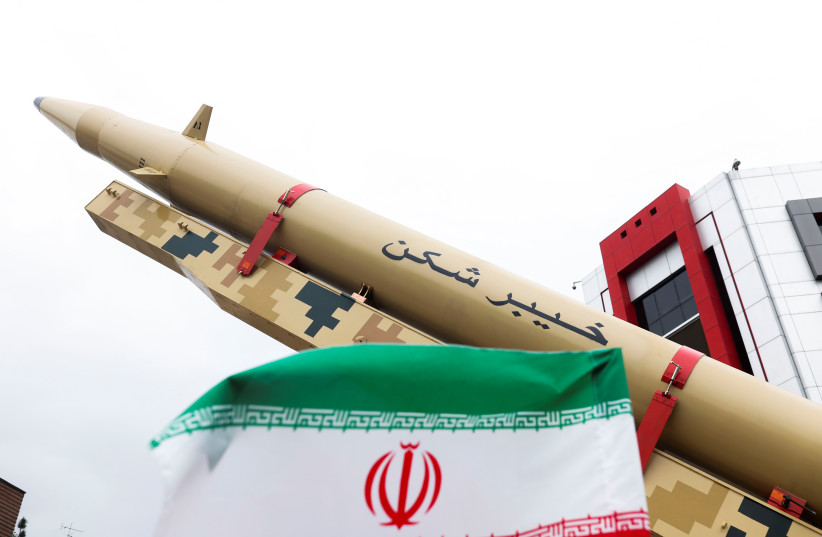IAEA Chief: Despite Iran attacks on Israel, no one should hit Tehran nuke facilities
IAEA Director-General Rafael Grossi on Thursday said that no party should attack Tehran’s nuclear facilities. Iran has already attacked Israel twice from its territory and directs attacks on Jerusalem through its proxies.
In one of three news conferences and meetings he held in Iran, Grossi said, “I say this with regards to Iran… nuclear installations should not be attacked,” according to AFP.
“It is in our power here to take concrete steps that will indicate, to the US and the international community, that we can clarify things and move forward with concrete solutions.”
This is not the first time the IAEA chief has made such statements against attacking Iranian nuclear facilities, but it is the first time he has done so since the Islamic Republic struck the Jewish state on April 13-14, and again on October 1. Israel has argued that this gave the Israeli Air Force greater legitimacy than ever to strike Iran’s nuclear program. Defense Minister Israel Katz on Monday said that this legitimacy and ability are greater now than they have ever been.
Grossi made the comments at a news conference with the head of Iran’s Atomic Energy Organization, Mohammad Eslami. He said that “tangible, visible results” in talks with Tehran were vital to avoiding a war.
The IAEA chief also met with Iranian President Masoud Pezeshkian for the first time since he was elected in July. Pezeshkian told Grossi that Tehran was prepared to cooperate with the agency to clear up “alleged ambiguities” about Tehran’s nuclear work, according to state media.

Prepared to cooperate
On X/Twitter, Grossi wrote that the meeting was “an essential part of my visit to Iran – an opportunity to engage at the highest level with the new government, listen to his views, and explain my approach and efforts to make progress on one of the most challenging issues on the international agenda.”
Iranian Foreign Minister Abbas Araghchi even said that Iran is willing to resolve outstanding disputes over its nuclear program – but won’t succumb to pressure. This all comes as various European countries push for diplomacy before US President-elect Donald Trump’s return to the White House in January.
“The ball is in the EU/E3 court,” Araghchi wrote on X/Twitter following a conversation with Grossi. This is about three European countries – France, Britain, and Germany – which represent the West alongside the US at nuclear talks.
Iran is “willing to negotiate based on our national interest and inalienable rights, but not ready to negotiate under pressure and intimidation,” Araghchi said, according to state media. “I hope the other side will adopt a rational policy.”
A senior Iranian official told Reuters that Tehran would send a message to the three European powers through Grossi about Tehran’s seriousness in resolving its nuclear standoff, while stressing that any pressure on Tehran would have the opposite effect.
Diplomats told Reuters on Wednesday that Britain, France, and Germany are pushing for a new resolution against Iran by the IAEA board during the November 18-22 meetings to pressure Tehran over what they view as its poor cooperation.
During his first term from 2017-2021, Trump pulled the US out of the 2015 Joint Comprehensive Plan of Action nuclear deal with Iran, carried out a maximum pressure sanctions and psychological warfare campaign against Iran, supported Israeli operations against the country, and assassinated Islamic Revolutionary Guard Corps Quds Force Chief Qasem Soleimani.
“I am far from being able to tell the international community… what is happening. I would be in a very difficult position. So it’s like they [Iran] have to help us, to help them to a certain extent,” Grossi told Reuters on Tuesday on the sidelines of the COP29 climate summit in Baku.
Also on Tuesday, Grossi told CNN, “We are in a moment of particular tension. They have a lot of nuclear material… They do not have a nuclear weapon at this point. And we have to negotiate.”
Despite all of this, it seems Iran did not want to meet before it knew who would be the next inhabitant of the White House.
Back in September, Grossi noted that since Pezeshkian’s inauguration on July 30, there has been no progress whatsoever with the Islamic Republic despite public statements some of its officials have made about trying to improve the situation with the West.
Grossi said, “There has been no progress in the past 15 months towards implementing the Joint Statement of 4 March 2023,” in which Tehran had promised to start to fix a number of its nuclear violations and lack of cooperation with the UN nuclear watchdog.





Comments are closed.